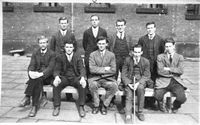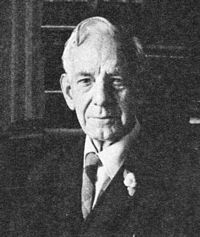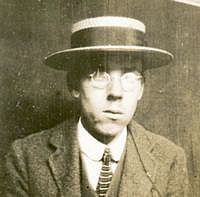
Conscientious Objectors
Conscientious Objectors
In 1651 George Fox was offered an army commission. His response is widely regarded as the first statement of the Quaker peace testimony:
I lived in the virtue of that life and power that took away the occasion of all wars... I told them I was come into the covenant of peace which was before wars and strifes were.
The Peace Testimony has led many (though not all) Quakers to refuse to bear arms or to play any part in military action.
'Essex Quakers and the First World War'. A talk prepared for Essex Radio by Adrian Smith of Chelmsford Meeting.
Below are two accounts of conscientious objection by men who later became members of Mid-Essex Area Meeting. Click on their photographs to go to their stories.
(The following is based on text from the Peace Pledge Union website, http://www.ppu.org.uk/learn/infodocs/cos/st_co_wwone.html)
There have always been people who are committed to an idea, an ideal, a value, a religion, a cause. Among them, there have always been people convinced that, at whatever risk to themselves, their commitment must not involve the use of violence or war. They have hung on to that conviction despite being despised, condemned and punished for it. It takes a lot of courage to hold out against violence and killing when your family and friends are threatened and may themselves turn against you, when you face public hostility and hatred, when the leaders of your society are determined that war, not peace, is the right and heroic way forward, and when you are accused of being a coward and a traitor.
In 1914, after 20,000 casualties had been recorded in the first two weeks of the war, compulsory call-up for British men looked increasingly likely. Pacifist members of the No-Conscription Fellowship, set up in 1915, successfully campaigned to secure 'the conscience clause' in the 1916 Conscription Act: the right to claim exemption from military service.
In Britain, the Friends Ambulance Unit (FAU) was established by Quakers in 1914. It operated ambulances, set up casualty hospitals and carried out relief work in France and Belgium. When conscription was introduced in 1916, military tribunals were set up for those wishing to claim exemption from military service under the ‘conscience clause’. Those ‘absolutists’ who refused any form of alternative service could face a harsh regime in gaol.
Over 16,000 men claimed exemption. They were required to attend a tribunal (an interviewing panel with legal authority) to have the sincerity of their claims assessed. The government meant well: these tribunals were intended to be humane and fair. But it was left to local councils to choose the people who actually sat on the panels, and they often selected themselves. They were a mixed bunch: businessmen, shopkeepers, landowners, retired military officers, civil servants and the like, most of them too old to be called up. Most were also strongly patriotic and therefore prejudiced against anyone whom they thought was not. Often they were people 'of not very great depth of vision or understanding', genuinely confused about their task and its complicated guidelines.
The COs came from all walks of life, and varied widely in their ability to cope with often rude and aggressive interviewers. Some didn't get a chance to say a word, other embarked on well-prepared argument. Whatever they said, the result was the same: only a handful received full exemption, and many were denied any form of exemption at all.
On the whole, conscientious objectors were treated more sympathetically in the Second World War. The FAU was re-formed in September 1939 and undertook ambulance work in Europe and North Africa. In Britain, they provided emergency relief in bombed cities and assistance in short staffed hospitals. In the Far East, they transported medical supplies along the Burma Road, and provided medical and civilian relief in China.


